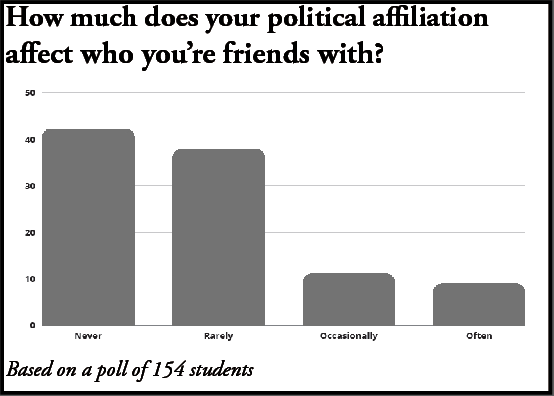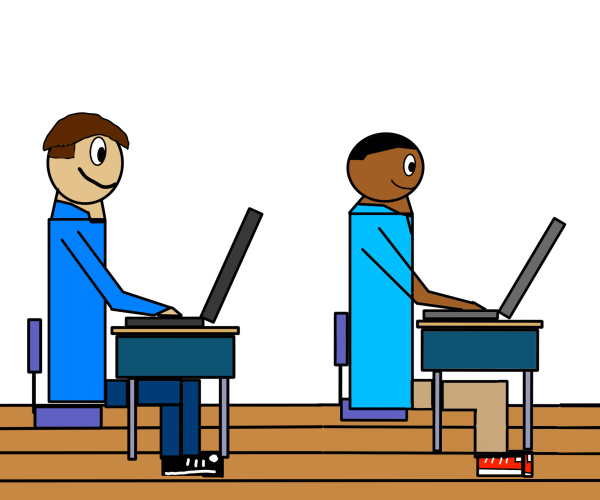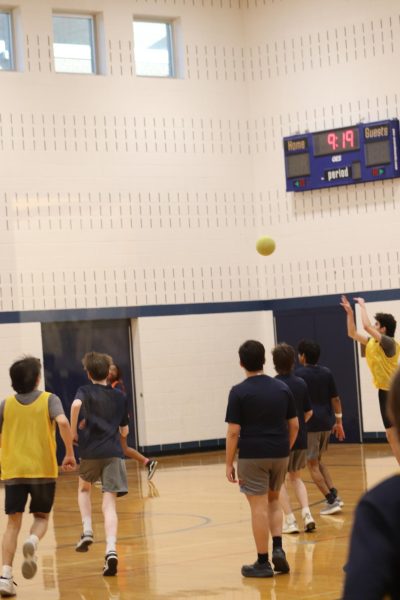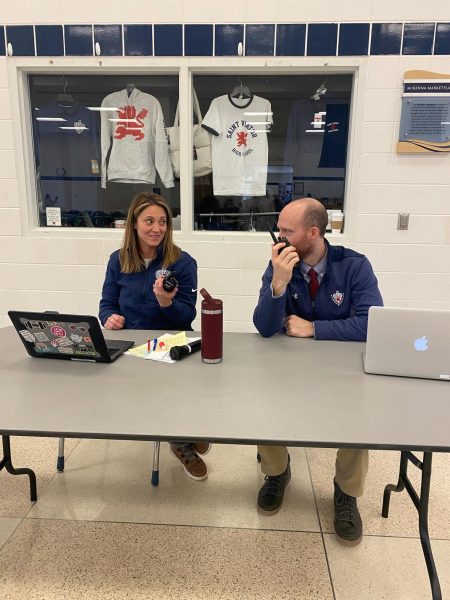Friends with my enemy
Can political differences coexist in everyday relationships?
Politics has become an incredibly relevant and sensitive topic in the 21st century, especially in regards to the beliefs of teenagers and teachers. Increasing number of teenagers have started to voice their opinions on government issues through sources such as TikTok and Instagram. Teenagers’ voices have become even more amplified during the pandemic. At Viator, the beliefs of students are an important part of the school’s dynamic. Many students’ political views have impacted the relationships they have formed with fellow students and their peers.
“I’m friends with a lot of people who feel the same as I do,” said senior Mikey DiMucci. “I personally don’t care about political beliefs because I believe in respect, but there are truly some people who cannot get along with someone who thinks differently from another person.”
Multiple students have expressed that their political views have affected their friendships with fellow classmates. Some students have revealed that their political beliefs have ended some friendships while others indicated that it made their relationship stronger. Numerous students do not talk about politics with their friends, and others try to look past their opposing views
“I like to talk about politics with my friends that I know I have similar political standings to because it’s much less toxic and less competitive, but with my friends who don’t agree with half the things I believe, I immediately try to stop every single conversion that can lead to politics,” said a senior who prefers to stay anonymous. “I do not want these people to hate me because of what I believe. I’ve experienced lots of other things in Ethics. Lots of people who tend to be much more dismissive to other people’s political ideologies. That usually tends to lead to a much more toxic environment, where people won’t listen to the other side of the argument—they’ll just talk to their friends on Instagram or iMessage about that.”
Specifically, the debate on mask-wearing has been a hot topic recently. There has been some division throughout the school regarding this. Many students have voiced their opinion on this topic and there have been repercussions inside and outside of the classroom.
“It was kind of awkward with my friends the first day the school went mask optional,” said an anonymous source. “However, I have been able to remain close with my same friends regardless of their political beliefs, specifically regarding the mask policy.”
Despite trying to keep friendship and politics separate, many people find this difficult. People’s beliefs have become so intertwined with their personality and sense of morality that it is nearly impossible to ignore the ideologies of others, especially friends and teachers.
“When adults express their political beliefs, it is rarely a blatant statement of opinion,” said another anonymous source. “Instead, teachers include subtle hints regarding various political subjects.”
However, students are not the only people who have been feeling the political tensions at Viator. Teachers can also impact the political environment. It differs from teacher to teacher, but a solid majority avoid bringing their political views into class. According to a poll of 12 teachers and 45 students, almost every teacher and 87% of students expressed how they rarely or never incorporated/observed political bias in the learning environment.
“We certainly have political discussions from time to time, mostly pertaining to the news,” said Mr. Jensen, a social studies teacher. “There is a diverse array of opinions within our department, and those differences are generally respected. So, I don’t believe that I’ve seen any negative impact.”
The positive conversation between teachers needs to be seen in all facets of the school. Conversation that encourages peace and love instead of conflict needs to be encouraged.
“It’s best to leave political beliefs at the door,” said Mr. Jensen. “If there is any perspective that I believe we can be biased towards at St. Viator it is that of the Catholic Church and its teachings…Regardless of our political beliefs we should certainly be able to find common ground within Christ, the Church, and each other in this community. We are fortunate to be here together and have this opportunity to build on our relationships with God, one another, and the pursuit of truth. It is wrong, in my opinion, for a teacher to be an activist first and teacher second, presenting their personal political beliefs as truth.”
Many find the issue of personal politics to be made in its fandom characterization, presenting more of a bandwagon effect rather than an intellectual philosophy to follow.
“My frustration is with individuals who blindly follow anything because the group they subscribe to said so, or to counter what the opposition believes,” said fine arts teacher Mr. CJ Zimmeran, “I feel like if we all actually took the time to listen to differing opinions and engaged in constructive discussion we would find out we’re all are more similar than we originally thought, and more often than not, we don’t really 100 percent align with any one ‘side’ or group.”
People must be more open to conversation amongst each other and willing to consider differing views.
“Through disagreement and civil discourse we are capable of arriving at greater truth,” said Mr. Jensen. “If we can embrace that form of discussion—one directed at friendship and the primacy of truth (not relative truth, but objective)—then we can maintain a productive learning environment despite any political differences.”
Politics aren’t the deciding factor for most relationships.
“My friends all respect my political beliefs and I respect theirs,” said junior Jack Spalding. “We might get into arguments sometimes, but it is usually lighthearted or jokingly.”
“I’m definitely more than willing to look past political beliefs to be friends with someone,” said sophomore Emily Reyna. An opinion on some random people and policies shouldn’t affect what I think about people. It’s the personality and who they are at heart that matters.”
“I think that we should start having more conversations with controversial topics and try to understand both sides of the argument rather than shutting one down,” said freshman Nevaeh Szparkowski. “We should also try, when everyone feels comfortable, to have some of those more difficult conversations.”
The general consensus reveals that students aim to listen to others, regardless of their political beliefs. Whether the topic is mask mandates or legal policies, at the end of the day, people desire respect—which students can freely give.
Your donation will support the student journalists of Saint Viator High School. Your contribution will allow us to purchase equipment and cover our annual website hosting costs.







